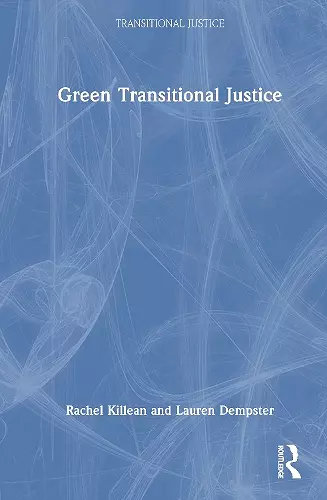Green Transitional Justice
Rachel Killean author Lauren Dempster author
Format:Hardback
Publisher:Taylor & Francis Ltd
Published:30th Jun '25
Currently unavailable, and unfortunately no date known when it will be back
This hardback is available in another edition too:
- Paperback£37.79was £41.99(9781032206202)

This book rethinks the boundaries of transitional justice, urging scholars and practitioners to confront the often-overlooked nexus between mass violence and ecological harm.
Through an in-depth analysis of the field’s limitations – such as its anthropocentric legalism, neocolonial practices, and alignment with neoliberalism – the book critiques the historical marginalisation of Nature in transitional justice discourse and practice. It argues that ignoring environmental harm not only undermines the possibility of holistic justice but also perpetuates structural violence and inequality. In response, the book sketches a ‘greener’ transitional justice, integrating principles from environmental justice, Indigenous knowledge systems, and ecocentric perspectives. It explores the possibilities of recognising Nature as a victim of mass violence, adapting existing mechanisms to incorporate environmental harm, and fostering transformative approaches premised on the interdependence of human and ecological well-being.
This book is written for students, researchers, and practitioners of transitional justice and fields related to conflict transformation, peacebuilding, environmental protection, and development.
“This is an exceptional book. It meets the vital need for transitional justice to acknowledge harms to Nature as simultaneously antecedent and connected to the harms of mass violence. The book is prescient in its demand to revolutionize transitional justice by decolonizing and greening the field, and by providing a multifaceted roadmap on how to do it. It allows us to think beyond anthropocentric transitional justice and confront the field’s visible fault lines. It makes an outstanding contribution to the field.” Fionnuala Ní Aoláin KC (Hons)
"Green Transitional Justice argues that failures to account for harms against nature deliver incomplete justice. They are right. Human rights are limited by their relentless focus on humans. Perhaps the time has come to recognize the hegemonic colonialism of the human race over all other life forms on this shared planet. This means recognizing rights tout court without any modifier. Pain is not a uniquely human experience. Killean and Dempster deliver a book that is exhaustively researched and exhilaratingly novel; it is precise and probative while also bursting with panache. The authors identify the shortcomings of neo-liberalist transitional justice, and then also inspire with their engagement with alternate paths forward." Mark Drumbl, Director, Transnational Law Institute, Washington and Lee University, USA.
"This brilliant book provides a thoughtful and thought-provoking argument for including consideration of harms against Nature and ecological restoration alongside human reparation in the transitional justice process. Critical, compassionate and challenging, it is sure to stimulate significant conceptual and practical reflection about greening transitional justice now and into the future. A must read." Rob White, Emeritus Distinguished Professor, University of Tasmania, Australia.
“This book is a groundbreaking call to expand the scope of transitional justice by embracing ecological inclusivity. By advocating for an ecocentric framework, it challenges traditional anthropocentric norms and highlights the profound interconnectedness of human and natural systems. The vision of a "green" transitional justice presented here is both ambitious and inspiring, urging a shift from short-term recovery models to a transformative approach that integrates ecological stewardship, relationality, and reciprocity. The book's emphasis on addressing environmental harm alongside human reparations is a timely reminder that true peace requires justice for ecosystems and biodiversity as much as for human communities. By redefining legal categories and power structures, it offers a hopeful blueprint for a future where human and ecological flourishing go hand in hand. This is a must-read for students and scholars, or indeed anyone, committed to sustainable, inclusive justice in a rapidly changing world.” Damien Short, Co-Director Environmental Humanities Research Hub, School of Advanced Studies, University of London, UK.
ISBN: 9781032206219
Dimensions: unknown
Weight: 3150g
292 pages